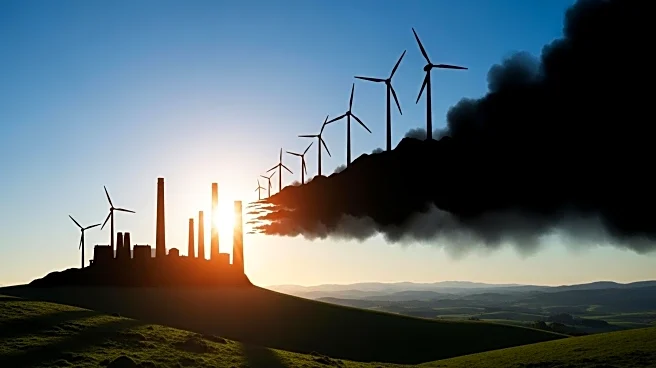What's Happening?
South Africa's transition from coal to clean energy is being showcased by the UN Climate Change organization as a model for climate mitigation. The initiative, supported by international partnerships, aims to protect workers and communities while scaling up renewable energy to enhance energy security. The funding for this transition has increased from $8.5 billion to $11.6 billion. The UN is encouraging African governments to present new national climate plans to boost economies and living standards. These plans are seen as blueprints for stronger economies, job creation, and improved living standards across Africa. The UN is calling for countries to submit their Nationally Determined Contributions (NDCs) ahead of key milestones, including the UN Secretary General's Climate Summit and COP30 in Brazil.
Why It's Important?
The transition to clean energy in South Africa is significant as it sets a precedent for other African nations to follow. By shifting from coal to renewable energy, South Africa is not only addressing climate change but also creating economic opportunities and jobs. This move is crucial for Africa, which faces severe climate impacts but also holds potential for innovative solutions. The UN's emphasis on new national climate plans highlights the importance of global cooperation in tackling climate change. These plans can unlock economic benefits, create millions of jobs, and help limit global warming to 1.5°C above preindustrial levels.
What's Next?
Countries are expected to submit their NDCs ahead of the UN Secretary General's Climate Summit and COP30. These submissions will continue in the lead-up to COP30, with each plan contributing to global efforts to limit climate change. The UN is urging all nations, especially the largest economies, to put forward ambitious plans to strengthen the collective response to climate change and drive national prosperity and security.
Beyond the Headlines
South Africa's transition is part of a broader movement across Africa, with countries like Nigeria and Morocco also advancing renewable energy initiatives. Nigeria is focusing on job creation and poverty reduction through climate action, while Morocco is emerging as a regional leader in renewable energy. These efforts demonstrate Africa's potential to lead in the global green transition, despite facing significant climate challenges.










